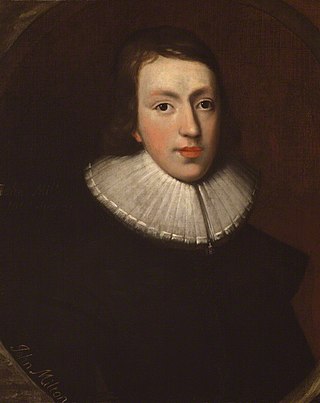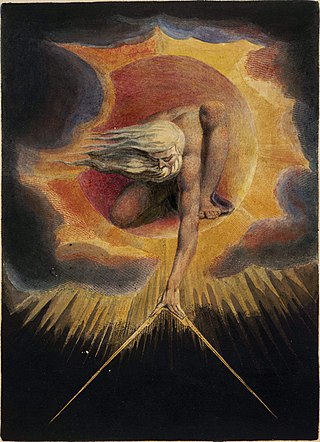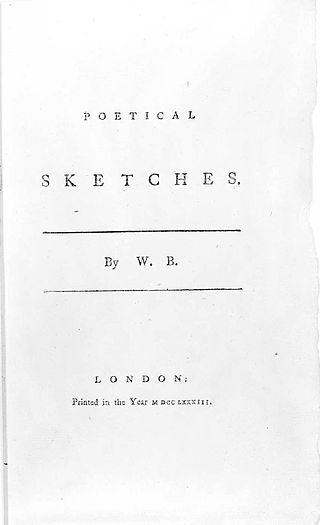Related Research Articles

John Milton was an English poet and intellectual. His 1667 epic poem Paradise Lost, written in blank verse and including over ten chapters, was written in a time of immense religious flux and political upheaval. It addressed the fall of man, including the temptation of Adam and Eve by the fallen angel Satan and God's expulsion of them from the Garden of Eden. Paradise Lost elevated Milton's reputation as one of history's greatest poets. He also served as a civil servant for the Commonwealth of England under its Council of State and later under Oliver Cromwell.

In Greek mythology, Prometheus is sometimes referred to as the Titan god of fire. Prometheus is best known for defying the Olympian gods by stealing fire from them and giving it to humanity in the form of technology, knowledge, and more generally, civilization.

Literary theory is the systematic study of the nature of literature and of the methods for literary analysis. Since the 19th century, literary scholarship includes literary theory and considerations of intellectual history, moral philosophy, social prophecy, and interdisciplinary themes relevant to how people interpret meaning. In the humanities in modern academia, the latter style of literary scholarship is an offshoot of post-structuralism. Consequently, the word theory became an umbrella term for scholarly approaches to reading texts, some of which are informed by strands of semiotics, cultural studies, philosophy of language, and continental philosophy.

Wallace Stevens was an American modernist poet. He was born in Reading, Pennsylvania, educated at Harvard and then New York Law School, and spent most of his life working as an executive for an insurance company in Hartford, Connecticut. He won the Pulitzer Prize for Poetry for his Collected Poems in 1955.

This article focuses on poetry from the United Kingdom written in the English language. The article does not cover poetry from other countries where the English language is spoken, including Republican Ireland after December 1922.

The Anxiety of Influence: A Theory of Poetry is a 1973 book by Harold Bloom. It was the first in a series of books that advanced a new "revisionary" or antithetical approach to literary criticism. Bloom's central thesis is that poets are hindered in their creative process by the ambiguous relationship they necessarily maintain with precursor poets. While admitting the influence of extraliterary experience on every poet, he argues that "the poet in a poet" is inspired to write by reading another poet's poetry and will tend to produce work that is in danger of being derivative of existing poetry, and, therefore, weak. Because poets historically emphasize an original poetic vision in order to guarantee their survival into posterity, the influence of precursor poets inspires a sense of anxiety in living poets. Thus Bloom attempts to work out the process by which the small minority of 'strong' poets manage to create original work in spite of the pressure of influence. Such an agon, Bloom argues, depends on six revisionary ratios, which reflect Freudian and quasi-Freudian defense mechanisms, as well as the tropes of classical rhetoric.

In the mythology of William Blake, Urizen is the embodiment of conventional reason and law. He is usually depicted as a bearded old man; he sometimes bears architect's tools, to create and constrain the universe; or nets, with which he ensnares people in webs of law and conventional society. Originally, Urizen represented one half of a two-part system, with him representing reason and Los, his opposition, representing imagination. In Blake's reworking of his mythic system, Urizen is one of the four Zoas that result from the division of the primordial man, Albion, and he continues to represent reason. He has an Emanation, or paired female equivalent, Ahania, who stands for Pleasure. In Blake's myth, Urizen is joined by many daughters with three representing aspects of the body. He is also joined by many sons, with four representing the four elements. These sons join in rebellion against their father but are later united in the Last Judgment. In many of Blake's books, Urizen is seen with four books that represent the various laws that he places upon humanity.

Harold Hart Crane was an American poet. Provoked and inspired by T. S. Eliot, Crane wrote modernist poetry that was difficult, highly stylized, and ambitious in its scope. In his most ambitious work, The Bridge, Crane sought to write an epic poem, in the vein of The Waste Land, that expressed a more optimistic view of modern, urban culture than the one that he found in Eliot's work. In the years following his suicide at the age of 32, Crane has been hailed by playwrights, poets, and literary critics alike, as being one of the most influential poets of his generation.

Ahania is the Emanation, or female counterpart, of Urizen, Zoas of reason, in William Blake's mythology. She is the representation of pleasure and the desire for intelligence. Although Urizen casts her out as being the manifestation of sin, she is actually an essential component in Blake's system to achieving Divine Wisdom. She is a figure of the goddess of wisdom. It is through her that the sons and daughters of Urizen are born. In the original myth, her son Fuzon rebels against his father and is responsible for separating Urizen and Ahania. In his later version, Ahania is separated from Urizen after he believes that she is sinful.
Sandra M. Gilbert is an American literary critic and poet who has published in the fields of feminist literary criticism, feminist theory, and psychoanalytic criticism. She is best known for her collaborative critical work with Susan Gubar, with whom she co-authored, among other works, The Madwoman in the Attic (1979). Madwoman in the Attic is widely recognized as a text central to second-wave feminism. She is Professor Emerita of English at the University of California, Davis.
Poetic tradition is a concept similar to that of the poetic or literary canon. The concept of poetic tradition has been commonly used as a part of historical literary criticism, in which a poet or author is evaluated in the context of his historical period, his immediate literary influences or predecessors, and his literary contemporaries. T. S. Eliot claimed in Tradition and the Individual Talent, published in 1919, that for a poet to fully come into his own, he must be aware of his predecessors, and view the work of his predecessors as living, not dead. The poetic tradition is a line of descent of poets who have achieved a sublime state and can surrender themselves to their work to create a poem that both builds on existing tradition and stands on its own.

"Ah! Sun-flower" is an illustrated poem written by the English poet, painter and printmaker William Blake. It was published as part of his collection Songs of Experience in 1794. It is one of only four poems in Songs of Experience not found in the "Notebook".
Anxiety of Influence is a type of literary criticism established by Harold Bloom in 1973, in his book, The Anxiety of Influence: A Theory of Poetry. It refers to the psychological struggle of aspiring authors to overcome the anxiety posed by the influence of their literary antecedents.
"Tea at the Palaz of Hoon" is a poem from Wallace Stevens's first book of poetry, Harmonium. It was first published in 1921, so it is in the public domain.
"The Man Whose Pharynx Was Bad" is a poem from Wallace Stevens's first book of poetry, Harmonium. First published in 1921, it is in the public domain in the United States.

Poetical Sketches is the first collection of poetry and prose by William Blake, written between 1769 and 1777. Forty copies were printed in 1783 with the help of Blake's friends, the artist John Flaxman and the Reverend Anthony Stephen Mathew, at the request of his wife Harriet Mathew. The book was never published for the public, with copies instead given as gifts to friends of the author and other interested parties. Of the forty copies, fourteen were accounted for at the time of Geoffrey Keynes' census in 1921. A further eight copies had been discovered by the time of Keynes' The Complete Writings of William Blake in 1957. In March 2011, a previously unrecorded copy was sold at auction in London for £72,000.

Harold Bloom was an American literary critic and the Sterling Professor of Humanities at Yale University. In 2017, Bloom was called "probably the most famous literary critic in the English-speaking world." After publishing his first book in 1959, Bloom wrote more than 50 books, including over 40 books of literary criticism, several books discussing religion, and a novel. He edited hundreds of anthologies concerning numerous literary and philosophical figures for the Chelsea House publishing firm. Bloom's books have been translated into more than 40 languages. Bloom was elected to the American Philosophical Society in 1995.
In William Blake's mythology, Beulah, originally Hebrew בְּעוּלָה, is "the realm of the Subconscious, the source of poetic inspiration and of dreams." It is also, according to Blake scholar Alexander S. Gourlay, "a dreamy paradise where the sexes, though divided, blissfully converse in shameless selflessness. Beulah is available through dreams and visions to those in Ulro, the utterly fallen world." Between Eternity and Ulro, it is imagined as a place without conflict similar to a conventional image of heaven or Eternity. However, for Blake, the idea of an everlasting peaceful Eternity is misguided and fallen.
"Night" is a poem in the illuminated 1789 collection Songs of Innocence by William Blake, later incorporated into the larger compilation Songs of Innocence and of Experience. "Night" speaks about the coming of evil when darkness arrives, as angels protect and keep the sheep from the impending dangers.

Romanticism was an artistic, literary, and intellectual movement that originated in Europe toward the end of the 18th century. Scholars regard the publishing of William Wordsworth's and Samuel Coleridge's Lyrical Ballads in 1798 as probably the beginning of the movement, and the crowning of Queen Victoria in 1837 as its end. Romanticism arrived in other parts of the English-speaking world later; in the United States, it arrived around 1820.
References
- ↑ D. Erdman, The Complete Poetry and Prose of William Blake (2008) p. 944 and p. 926
- ↑ N.Marsh, William Blake: The Poems (2012) p. 36
- ↑ Harold Bloom
- ↑ H. Bloom, The Anxiety of Influence (1973) p. 39 and p. 21
- ↑ J. Childers ed., The Columbia Dictionary of Modern Literary and Cultural Criticism (1995) p. 14
- ↑ L. Hudson/B. Jarot, The Way Men Think (1993) p. 44
- ↑ S. Freud, New Introductory Lectures on Psychoanalysis (PFL 2) p. 96
- ↑ Bluebeard Gothic (2012)
- ↑ M. Keane, John Milton's Paradise Lost (2013) p. 75
- ↑ J. Doane, Nostalgia and Sexual Difference (2013) p. 90-1